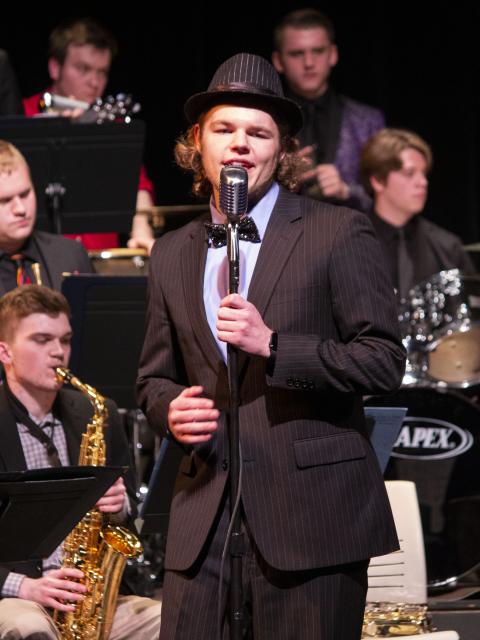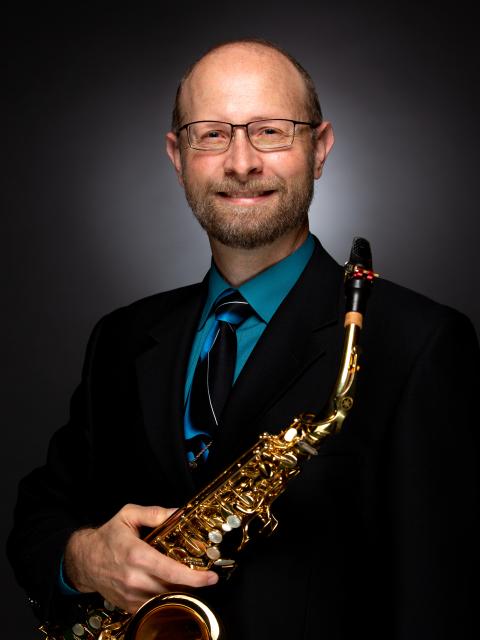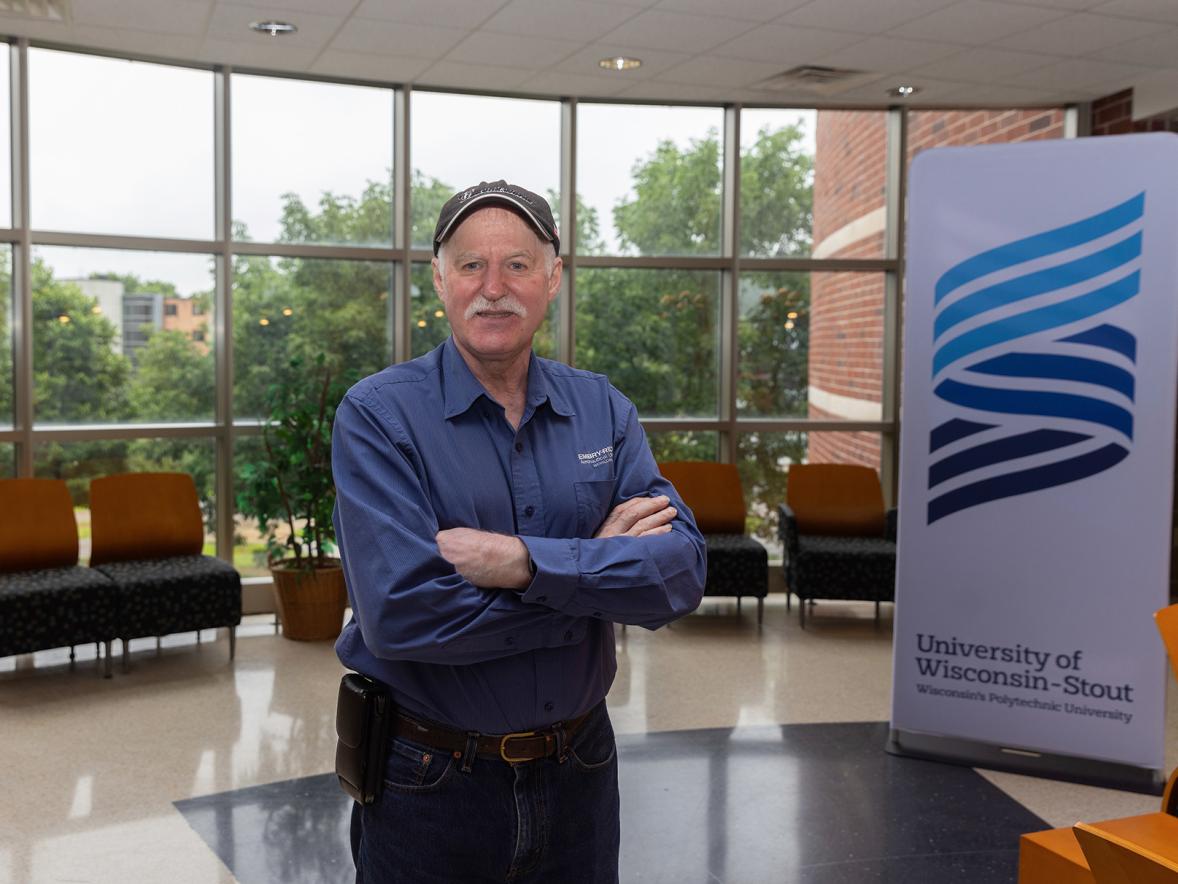After a year away from live performances because of COVID-19, the University of Wisconsin-Stout Blue Devil Jazz Orchestra will present Jazz in the Memorial Student Center Great Hall at 7 p.m. on Saturday, Nov. 13.
Tickets are $5 and are available online at tickets.uwstout.edu, at the MSC Service Center and the door. Audience size will be limited to 100 people, and masks are required in university buildings.
The Jazz Orchestra, under the direction of Professor Aaron M. Durst, will perform along with two other groups.
The Jazz Embers jazz combo has six members who will perform “St. Thomas” by Sonny Rollins, based on a Virgin Islands folk song his mother sang to him as a child; “Autumn Leaves” from 1945 that was written for a French film and has become a favorite for jazz musicians and most often performed in a swing style; and “Take the ‘A’ Train” by Billy Strayhorn, which in 1939 became the theme song for the Duke Ellington orchestra and a favorite of many jazz fans, Durst said.
The Blue Devil Jazz Project, a New Orleans street-style band with 22 members, will perform “When the Saints Go Marching In,” a spiritual made famous by Louis Armstrong in the 1930s; “The Chicken,” written by James Brown saxophonist Pee Wee Ellis and recorded by the James Brown Band in 1969; and close out their set with a piece by the Youngblood Brass Band “Jumpin’ the Buck” written by Nat McIntosh.

The Blue Devil Jazz Orchestra has 24 members this year.
The orchestra’s selections will include two that contrast the styles made famous by bands four decades apart: Glenn Miller’s “American Patrol” recorded in 1942 contrasted with Maynard Ferguson’s interpretation of “Theme from Sesame Street” recorded in 1982. The band will also perform a 1967 song “Ponteio” by Brazilian musicians Edu Lobo and Jose Capinan.
Student instrumentalists will be featured in several songs including Ryland Cook, Farmington, Minn., a sophomore applied mathematics and computer science major, on trombone playing “I Got Rhythm” by George Gershwin published in 1930; “Bayou Farewell” is a ballad by Graham Breedlove featuring Alex Kimble, of Prior Lake, Minn., a senior computer science major, on flugelhorn and Max Willman, of Medford, a sophomore game design and development-art major, on soprano saxophone; and “Brooklyn” is another selection by McIntosh that will feature senior Spencer Berndt, of Fish Creek, an applied mathematics and computer science major, on sousaphone.
Three student vocalists to perform
Three student vocalists will step up to the microphone to sing with the band.
Willman will sing the bossa nova song “The Girl From Ipanema”; senior Ira Hoffman, of Morris, Minn., computer science and applied math and computer science, will sing the rhumba-style ”Save the Last Dance for Me”; and graduating senior Sam Poncelet will sing “Feeling Good.”

As Poncelet, of Hastings, Minn., a computer networking and information technology major, prepares to graduate, he reflected on his time at UW-Stout and his involvement in band and choir ensembles.
“I enjoy participating in jazz band because it is just a break from all my other classes and things going on in my life,” Poncelet said. “It’s a comforting and friendly space no matter who you’re with, and the music gives me a time and place to let my mind be free of all other worries and stresses.”
Faculty Saxophone Recital
On Thursday, Nov. 11, Durst presents a Faculty Saxophone Recital at 7 p.m. in the Great Hall. The recital is free and open to the public. Tickets are not required.
Four new pieces of music will be performed.
The “Sonatina” for alto saxophone and piano by Denis Bédard and “Brazilian Landscapes No. 21” for tenor saxophone and piano by Liduino Pitombeira were the result of a commissioning consortium Durst was a part of last year to add new works to increase the literature suitable for college-level student saxophonists. Amanda Durst will play piano for both of these works.

“Two Shorter Songs” by Jay Batzner is based on two poems by Dora Sigerson Shorter titled “Beware and “Eclipse.” Jerry Hui, director of UW-Stout’s new major in arts administration and entrepreneurship and director of choral activities, was also moved to write something for this same pairing and wrote “Three Merton Songs” based on the poems “Love Winter When The Plant Says Nothing,” “O Sweet, Irrational Worship” and “Wisdom” by Thomas Merton.
“This combination of timbres has struck me as very complimentary, being able to weave in and out of each other,” Durst said of Hui’s composition. “The tonalities are challenging for the listener but compliment the poetic text.”
Hui said: “In these three poems, there is a strong admiration for the quiet beauty of nature; my musical setting strives for a simplicity that favors (the) understanding of the text, shaded by the intervallic play between the voice and the instrument.”
Teaching about the world of music
The Cedar Valley Brass Quintet will join the faculty recital to perform Fisher Tull’s “Concerto da Camera.” he group plays in western Wisconsin and eastern Minnesota. It consists of James Perkins, trumpet; Mike Fuller, trumpet; Laurel Volz, horn; Marsha Pearson, trombone; and Mark Perry, tuba.
“It is a very dynamic, exciting piece that I have been wanting to play since I first heard it about 15 years ago, and I am glad to be able to perform it with the Cedar Valley Brass,” Durst said.
“Billie” is a unique piece from Dutch composer JacobTV created in 2003. The work is based on the voice of Billie Holiday. The composer selected portions of radio interviews given by Holiday, then manipulated and combined her voice with piano, bass, drum and electronic sounds in a soundtrack that accompanies the live saxophone part. Christopher Barrick later created a video presenting images of Holiday, facts about her life and the text quoted in the recording.
“In presenting recitals, I hope that people will hear something new and different,” Durst said. “Many people associate the saxophone with jazz, but I perform modern art music for saxophone that is not jazz. There is a world of music out there that is new and different. It might be unusual or a bit abrasive or strange to our ears, but it is exciting, thought-provoking and inspiring. I hope that audience members leave knowing a little more about the world of music and perhaps wanting to seek out more music like they heard at my recital.”






